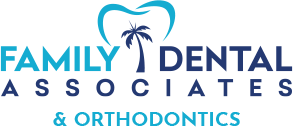
Keeping Teeth Clean and Healthy
Learning more information about your teeth and the proper technique with which to clean them is the first step on the journey to a healthy and beautiful smile. That is why we are so glad that you came to our oral hygiene page to learn more about the correct course of action when cleaning your teeth. The team at Family Dental Associates and the knowledge we possess is here for you. We would be thrilled if you read below to learn more about these oral-cleaning practices.
Brushing
Brushing is a key element to any oral regimen and should be number one on your techniques to utilize list if you are not doing so already. Be sure to use a toothbrush with soft bristles and a small strip of fluoride toothpaste. When brushing teeth, move the brush in small circular motions to reach food particles that may be under your gum line. Also, hold the toothbrush at an angle and brush slowly and carefully, covering all areas between teeth and the surface of each tooth. It will take you at a minimum of two minutes to thoroughly brush your teeth. Brush up on the lower teeth, down on the upper teeth and the outside, inside and chewing surface of all of your front and back teeth. Brush your tongue and the roof of your mouth before you rinse.
For optimal results, brush your teeth four times per day in order to avoid the accumulation of food particles and plaque. The times at which you should be brushing include:
- In the morning after breakfast
- After lunch or right after school
- After dinner
- At bedtime
As soon as the bristles start to wear down or fray, replace your toothbrush with a new one. Do not swallow any toothpaste. Rinse your mouth thoroughly with water after you finish brushing. It is important to carefully floss and brush daily for optimal oral hygiene.
Flossing
For areas between the teeth that a toothbrush can't reach, dental floss can be used to remove food particles and plaque. Dental floss is a thin thread of waxed nylon that is used to reach below the gum line and clean between teeth. It is very important to floss between your teeth every day.
Steps for good flossing technique include:
- Pull a small length of floss from the dispenser.
- Wrap the ends of the floss tightly around your middle fingers.
- Guide the floss between all teeth to the gum line, pulling out any food particles or plaque.
- Unwrap clean floss from around your fingers as you go so that you have used the floss from beginning to end when you finish.
- Floss behind all of your back teeth.
Floss at night to make sure your teeth are clean before you go to bed. When you first begin flossing, your gums may bleed a little. If the bleeding does not go away after the first few times, let a staff member know at your next appointment.
Diet Control
The teeth, bones and soft tissues of the mouth require a healthy, well-balanced diet. A variety of foods from the five food groups help minimize and avoid cavities and other dental problems. Consumption of foods that contain sugars and starches should be decreased. These foods can include candies, cookies, chips and crackers. Healthier foods, such as vegetables, low-fat yogurt and cheeses, help promote stronger teeth.
Dental Visits
You should visit your general dentist at least once every six months. In order to maintain a healthy smile, it is vital to have professional cleanings and regular check-ups. Your dentist will examine your teeth and provide an evaluation of existing dental problems and proposed treatment. If you have a dental emergency, you should call your dentist immediately.
Tooth Decay Prevention
Tooth decay is a progressive disease resulting in the interaction of bacteria that naturally occur on the teeth and sugars in the everyday diet. Sugar causes a reaction in the bacteria, causing it to produce acids that break down the mineral in teeth, forming a cavity. Dentists remove the decay and fill the tooth using a variety of fillings, restoring the tooth to a healthy state. Nerve damage can result from severe decay and may require a crown (a crown is like a large filling that can cap a tooth, making it stronger or covering it). Avoiding unnecessary decay simply requires strict adherence to a dental hygiene regimen: brushing and flossing twice a day, regular dental check-ups, diet control and fluoride treatment. Practicing good hygiene avoids unhealthy teeth and costly treatment.
Sealants
The grooves and depressions that form the chewing surfaces of the back teeth are extremely difficult (if not impossible) to clean of bacteria and food. As the bacteria reacts with the food, acids form and break down the tooth enamel, causing cavities. Recent studies indicate that 88 percent of total cavities in American school children are caused this way.
Tooth sealants protect these susceptible areas by sealing the grooves and depressions, preventing bacteria and food particles from residing in these areas. Sealant material is a resin typically applied to the back teeth, molars and premolars and areas prone to cavities. It lasts for several years but needs to be checked during regular appointments.
Fluoride
Fluoride is a substance that helps teeth become stronger and resistant to decay. Regularly drinking water treated with fluoride and brushing and flossing regularly ensures significantly lower cavities. Dentists can evaluate the level of fluoride in a primary drinking water source and recommend fluoride supplements (usually in tablets or drops), if necessary.
Set Up An Appointment Today!
Of course, while all these steps are important in maintaining good oral hygiene, it is still important to schedule regular check-ups and teeth cleanings. This will help to maintain the stellar smile your oral hygiene regimen has created for you. If you would like to schedule your semi-annual visit, be sure to contact us. Our friendly staff will work with you to make sure you and your smile are well taken care of. We look forward to seeing you soon!

